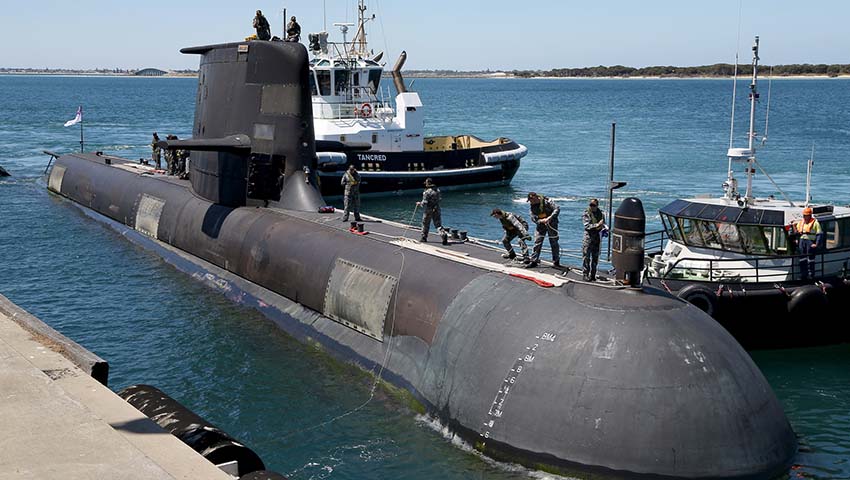Has Australia’s fixation on procuring next-generation submarines done more harm than good?
To continue reading the rest of this article, please log in.
Create free account to get unlimited news articles and more!
Last week, representatives from the Commonwealth government and the Australian Defence Force fronted the Senate foreign affairs, defence and trade legislation committee to discuss the nation’s nuclear-powered submarine procurement plan, announced as part of the new AUKUS alliance between Australia, the UK and the US.
Appearing before the committee on Wednesday (27 October), Secretary of Defence Greg Moriarty, Chief of Navy Vice Admiral Michael Noonan, and Chief of Joint Capabilities Vice Admiral Jonathan Mead, were asked to shed light on the expected delivery timeline for the next-generation submarines, which will replace the ageing Collins Class fleet.
VADM Mead confirmed he expected at least one nuclear-powered submarine to be operational before 2040 under the “worst case scenario”, adding Defence would look to drive the timeline “as far left as possible” over the next 18 months.
The representatives were also asked whether Defence would pursue an undersea stop-gap solution to fill potential capability gaps and reduce dependence on the ageing Collins Class vessels.
Secretary of Defence Greg Moriarty said the government would instead focus on enhancing capability across all warfighting domains.
According to Michael Shoebridge, director of ASPI’s defence, strategy, and national security program, this line of questioning is a reflection of a broader “obsession” with next-generation submarine procurement.
This “magic obsession” over commissioning new submarines as early as possible, he writes, has distracted from work to develop and procure other key defence capabilities.
“I get that the initiative to partner with the US and UK on nuclear submarines through AUKUS is a hugely important one for the security of our nation and for the wider Indo-Pacific. And I understand that submarines are powerful weapons that make potential adversaries think twice,” he notes.
“But we risk continuing a national obsession — seeing submarines as the one ‘magical animal’ defining the Australian Defence Force and our national security.”
Shoebridge claims the fixation on submarine procurement has “done more harm than good” over the 12 years since the 2009 Defence White Paper, which recommended an upgrade and expansion of the Royal Australian Navy’s submarine fleet.
“It’s important to work out how we get nuclear submarines into service safely and without delay,” he writes.
“But prioritising acceleration of the fiendishly complicated set of activities to create everything we need to help build and then crew, operate and sustain these nuclear-powered weapons because we want to rapidly increase the ADF’s offensive power would be a mistake.
“It may simply result in a troubled and delayed program. We are replete with examples where Australia’s (and other) defence organisations have done just that.”
Shoebridge acknowledges that nuclear submarines would be a “very potent deterrent weapon”, but argues the national conversation should pivot towards the earlier adoption of other multi-domain defence capabilities.
“The conversation we should have is about how other systems can provide the military effects we need in the short- to medium-term faster, more affordably and with less risk than SSNs,” he continues.
This, he points out, could include the provision of unmanned undersea systems over the next five years; investing in more Boeing Loyal Wingman unmanned aircraft; and larger, longer-range versions of them than manned F-35 fighters.
“We should do what Greg Mapson, former commander of the Navy’s unloved mine countermeasures arm, suggested recently: acquire large numbers of sea mines and work out how to deploy them in places that worry potential adversaries using existing ADF ships, planes and submarines — and the unmanned subs we should be getting in the water,” he adds.
The analyst says Defence could also spend more examining and testing plans to develop advanced missiles, or consider NASA’s approach to partnerships with space start-ups, which could result in a new, faster, cheaper business model for satellites, space vehicles and their launch and resupply.
Another missing part of the conversation, he adds, is an “overriding interest in holding public and private sector stakeholders to account for plans and investment “while they are still in their jobs”.
“We need to hold them to account after empowering them with resources and allowing them to take some risks and escape the interminable processes and layers we have inflicted upon ourselves with just about any important public or private undertaking,” he writes.
“This isn’t about ‘captain’s calls’ or eliminating paper trails. It’s about how we can shift from engineering-era acquisition, development and approval processes, and contractual relationships to processes designed around the much faster digital design and production processes we see with SpaceX and NASA — or Atlassian or DefendTex. In time frames that don’t start with skilling up our grandchildren.
“Government and commercial partners in Israel would be able to help us here too, because timely improvements to Israeli defence capability are important to them and they are good at doing practical things to achieve them.”
Shoebridge concludes: “This different national conversation will test the bipartisanship we know Australia needs on national security. It’ll also demonstrate whether we all really understand the security environment we are living in.
“Unlike hypothetical discussions about 2039 and 2040, it’ll ensure that at least some of the intense debates we’re having are about what we’re doing that helps us in the here and now.”
Get involved with the discussion and let us know your thoughts on Australia’s future role and position in the Indo-Pacific region and what you would like to see from Australia's political leaders in terms of partisan and bipartisan agenda setting in the comments section below, or get in touch with

 Login
Login







